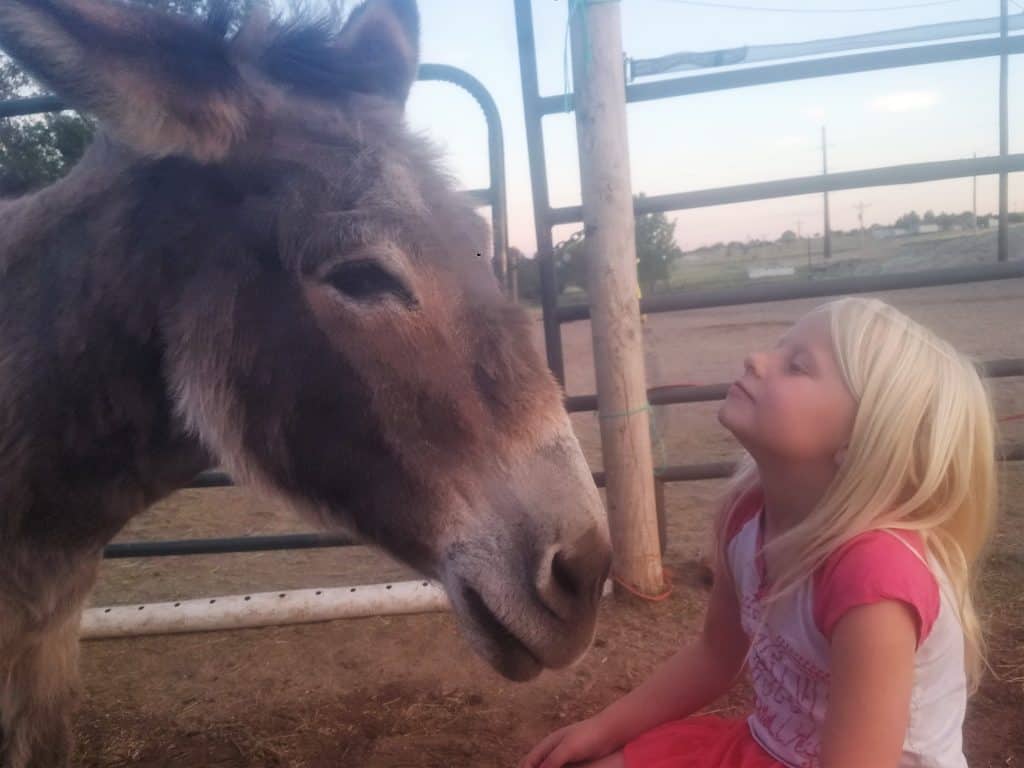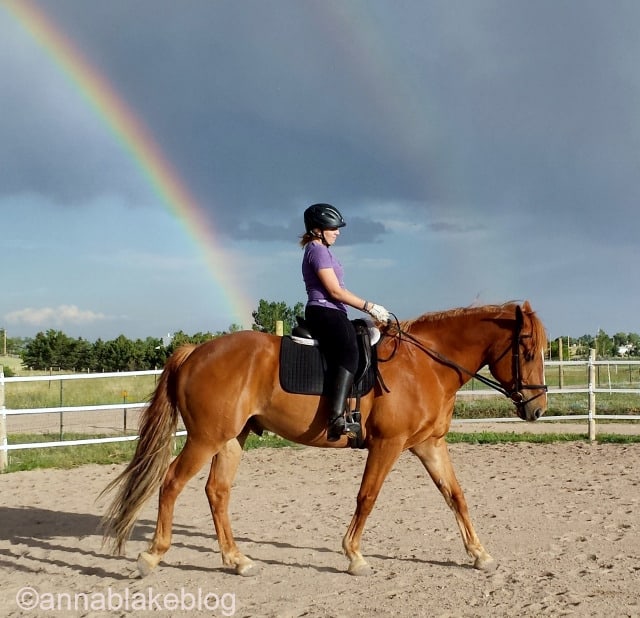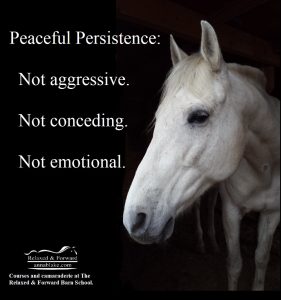
I can’t remember my age when I first saw Dogs Playing Poker, the famous painting by Cassius Marcellus Coolidge. It portrays dogs smoking cigars and playing cards. I didn’t see the original, of course, but a copy painted on velvet. It still offended my little girl’s sensibilities. I didn’t think dogs should smoke. Or maybe a romantic notion about card sharks, from the old west to present day Las Vegas, irritated me. They stood out from the crowd, shifty, but in a very cool Paul Newman kind of way. Every bit as unsettling as the dogs.
Some of us feel forever doomed. We will always think dogs dressed up acting like humans are an insult… to the dogs. Although I come from a cribbage-playing family, I will never understand games, cards or otherwise. Playing games wasn’t real-life enough for me. But don’t think I’m on any moral high ground. Everything changed when I called a donkey’s bluff. When I learned to play poker with horses. Is there Gamblers Anonymous for Horse Trainers?
Will anything be more interesting than meeting a horse and experiencing that first moment of sizing each other up? It isn’t about winning or losing. It’s about each asking the other “who are you?” And taking stock of each other’s poker-tells. Do they exude confidence or anxiety? Generosity or detachment? Or sometimes blunt fear. We both have clear memories of our past, and those experiences impact our perceptions and choices in the present. It matters who exhales first.
Humans think they can sell themselves as better than they are, but horses don’t try. Some horses hold their cards close to their chests, they keep their eyes still. Too still. Other horses show every card, anxious brows, polls tense for every move. But each horse is authentic. Even the stoic horses, those who shut down to protect themselves, are honest about who they are.
This is the analogy that just won’t die. There is even stud poker; games which include some cards face up. Face up is naked, no hint of deception, not that horses are even capable of it. Deception requires a frontal cortex. We are the only ones with that. And a reminder; the word stud refers to an animal who is not neutered and sometimes referred to as entire or intact. Mares usually fit that definition so well. In our world, mares might be the most shrewd players.
If you were to ask horses about playing poker with humans, my guess is there would be a lot of flehmen response. Lips would roll up, but it’s kinder than out-and-out laughter, which horses are too polite to do. Horses think humans are as easy to read as hay in a manger. And as foolish as a duck. Horses watch us flap ourselves up, and run around, quacking off in self-important ways, as they continue grazing.
Horses have acute senses and are aware, intuitive animals. They almost seen psychic by the time a human catches on to the thing they’ve already noticed. Because in comparison, human senses are not as sensitive as a horse’s, but then we don’t exercise the ones we have. We are lazy. We daydream, lollygagging in made-up stories about horses rather than listening to their calming signals in real time. It would be easier to believe horses are psychic than to focus with the intensity required to keep up with them mentally. Humans walk into doors, whether we are texting or not.
Horses are masters of subtly. Sometimes I wonder if they see us as foalish, ineffective communicators who can be emotionally unreliable. Everything about us is loud. We kick gates, wave our arms, rattle with frustration. We do four things at once, each more badly than the one before. And we talk too much to listen.
Meanwhile, we think we’re born leaders. We think we are cleverly hiding our feelings, but our breathing tells the truth. We spend more energy overthinking how we look in the mirror than focusing on what we are saying with our body language. Our human calming signals are honest as theirs. Even if we believe we can bluff our way through, the horse always sees us for who we are. We even walk into the barn in ALL CAPS.
My point is horses have an advantage over us. Calming signals have always been the primary language in the animal world. We like to think we’ve evolved into something better. But we would choke on our arrogance if we got stranded in their natural world. It would be hopeless except for another sense horses have. They read our intention. They show us grace when we try.
What if the highest form of horsemanship was all about reading the horse’s poker-tells or Calming Signals? It would mean that listening skills would be prized more than accomplishments. It would also mean we have some work to do on ourselves.
Does your horse anticipate transitions? Do they read your mind and take cues before you give them? Do they always seem one step ahead or sideways, or even bored? Sorry, your horse isn’t psychic. You are leaking a poker-tell that your horse can read. Most of us have learned to correct horses, but have limited knowledge of how to inspire them. Instead of dumbing our horses down with punishment, maybe it’s time we sharpen ourselves up to their level. We could respect our horses enough to pay attention to their side of the conversation.
You notice when your horse throws their head up and tenses from nose to tail. What if you could trace back and feel the anxiety when they gave a previous, smaller resistance? You could release that early bit of tension before it took over. It would keep the conversation in a whisper rather than yelling. Better yet, what if you gave a cue and recognized a tiny calming signal of assent from your horse? You could reward them for their intelligence as the result begins to play out. Would the horse think you were reading their mind?
Horses aren’t behaving differently. Their calming signals have always been there. We knew horses had opinions, but we haven’t responded well. We must give their feelings credence as a language, trust their intelligence, and aim to understand their answers. It means we consider them not as humans dressed up in horse suits, but as fully formed unique individuals, not less or more.
Building our own confidence and allowing the horse the same takes time. We know that, but it feels like more time than we think we have. Each half of a partnership must be whole for it to work. Then comes the day, the shining clarity of a rider’s mind becomes visible in the rhythmic beauty of a horse’s movement. And all debts are paid.
I’ve known people who didn’t think poker was a game so much as an analogy of navigating uncertainty in life. I doubt horses think any of this is a game either.

…
An audio version of this essay is available to those who subscribe on Substack.
Relaxed and Forward Training with Anna Blake is no longer on Facebook because of repeated hacking. If you or your horse appreciate my writing, please subscribe to this blog, share it with friends, and join me at The Barn School. Find me on Substack where I post The Gray Mare Podcast and on Blusky.

The Barn School is our social and educational site, with member sharing and our infamous Happy Hour. Everyone’s welcome.
Visit annablake.com for archived blogs, signed books, subscribe to this blog, or ask Anna a question about the art and science of working with horses.
Want more? Become a sustaining member, a “Barnie.” Subscribe to our online group and support the best bunch of like-minded horsepeople anywhere.
Ride for a new brand, find our Relaxed & Forward and Undomesticated Women swag at Zazzle.
“Most of us have learned to correct horses, but have limited knowledge of how to inspire them.” This introductory remark by a trainer would have certainly made me sit up and take notice, Anna. For me, it would have meant the beginning of a beautiful relationship with the trainer, my horse, and me.
It’s the flip side, isn’t it? Thanks Lynell.
Brilliant and brilliantly written!
Thanks, Verna.
This:
“Most of us have learned to correct horses, but have limited knowledge of how to inspire them.”
As Lynell pointed out – the best thing any trainer/mentor could offer. Or even my own heart if I could drown out my fears and the advice of people unasked for. Inspiration is such a fragile and precious thing.
Thank you for writing this.
Thanks Julie. Inspiring horses is what I teach and I do know initially it’s precious indeed. Ignore those railbirds!
Anna, as a human I am hopelessly task oriented. Balancing accomplishment with a horses perception of the task at hand is beyond difficult. Luckily I have a tiny mare with a warrior spirit. This mare’s calming signals are loud and clear compared to my 3 geldings. Recently, I felt the need to blanket her overnight during extreme overnight lows (likely unnecessary, but I’m a recovering caretaker and should probably seek help from caretakers anonymous). Anyway, this was my first attempt with her, so I had the presence of mind to focus on reading and respecting her calming signals. I had to step away from her a few times during the process, until SHE was ready to move forward. Bottom line: the skills that you are sharing really do work. Thank you for what you are doing, and all my horses send their gratitude as well.
Well done, Laurie. People always say horses are good teachers, but it isn’t true unless we become good listeners. Dear Type-A Sister… I hear you!
“Inspiring horses” is so beautiful, and contains an entire complex universe of mutual behaviors. It’s hard, I think, because we have to forego having any kind of ego or sense of “I know how this should happen.” At its most pure form, I think horses respond with wild positivity to joy. My few “big” breakthroughs with individual horses all had some form of joy underneath. Two examples: I couldn’t get my horse to open up to me. For the longest time (maybe a year?) any time I asked him to do something he’d respond with “got it”…no back and forth, no indication if it made him happy or unhappy or puzzled, just “got it”. Then one day I screwed up and gave him a bungled cue that could have been misinterpreted to be “canter now please. He cocked a questioning ear back (he loved to GO) but didn’t hit the gas. Something about his ear made me understand he wanted to go? I thought what the heck, let’s have some fun, and gave him the correct canter cue. His joy was infectious, and I realized how much he’d been holding himself in. So I just said “go for it” and he hit the gas with a ferocity that was breathtaking. I laughed and hung the heck on. That one moment changed our entire relationship. After that, he felt free to ask me questions and we began really communicating. Example two: working for an Arab trainer who had about 20 horses, mostly national level show horses. There was a mare. She was astonishing with children, so kind, perceptive, quiet and care taking. Exactly the opposite with adults…she was a dragon. No one but the trainer rode her. She wrung her tail, squealed and bucked and tried to run off. Physical issues had been ruled out. One day the trainer said “you know, she likes you, and you’re a quiet rider, would you be willing to see what’s up?”
I figured the first ride I’d just pleasantly hack around the arena. First thing she did was take off bucking, not like a bronc, but full of JOY at life and a little bit of devilishness..and then it felt like she was waiting for a response from me. I laughed…not at her, but filled with joy at her happiness, and asked her if she wanted to go some more. Turns out she didn’t. But we were great pals after that, and she never bucked, ducked out, or did any of her usual “adult rider” behaviors with me again. I’m not special, I don’t possess any magic horse knowledge, there are kazillions of better riders and horsemen women out there. Which leads me to believe she wasn’t waiting for the perfect rider. She was looking for a way to connect as herself, not as “the horse I’m riding”. Joy is an amazing connector, and something no one can fake. It’s inspiring. When I’m really stuck with a horse now, I try to think of ways we can feel joy or happiness in each others company. Really good, Anna!
I could be nuts. When I read this, both horses, kind of asked the same question. “Are you that person?” Meaning that human who controls and micromanages and fights with horses. You answered with a laugh, translated to by any horse as “No, I’m not that person.” I don’t think horses look for perfect riders, but riders who say NO with every cue makes them anxious. You let them move. they like to feel the glory of being a horse who gets to let that pony run. (horse joy) I think so much “training” involves corrections and little else. Could inspiration be as simple as a smile? Thanks, Jane.